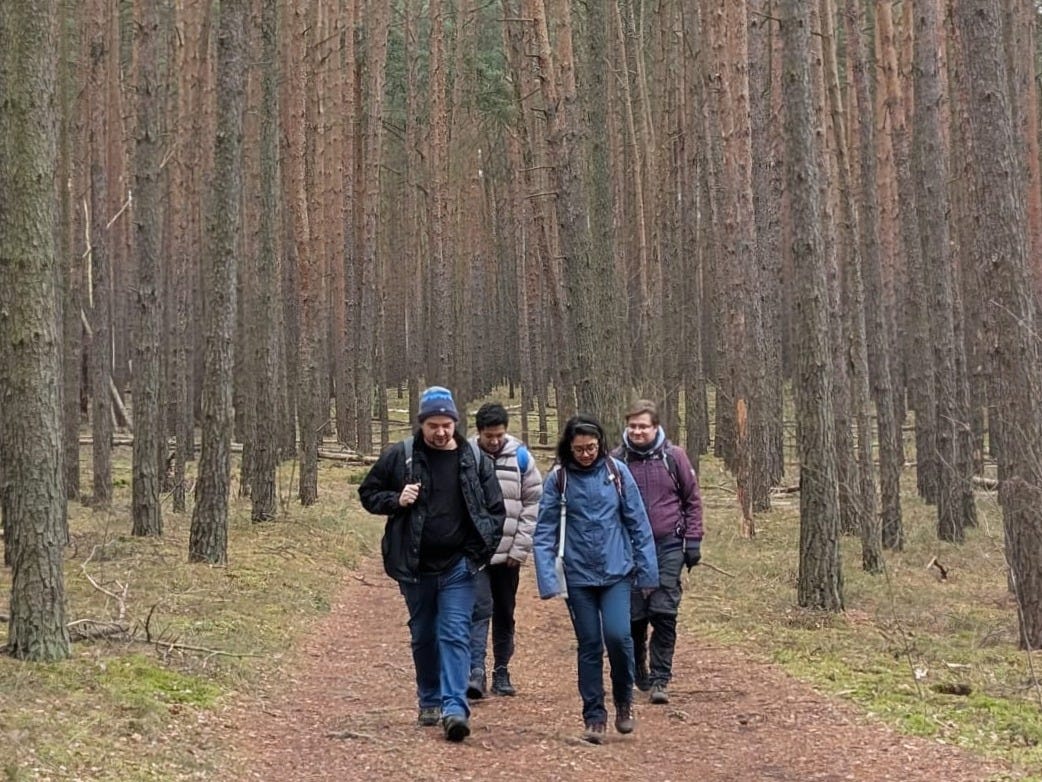"Test everything and hold fast to what is good"
Explore three principles for clarity – openness to new experiences, discerning what’s good, and trusting your own wisdom – and see how pilgrimage can help put them into practice.
Dear Pilgrims,
We are in a time of transition – not only on the calendar but also within ourselves. The first weeks of the year have passed, and with them, often, the New Year’s resolutions we had embraced with such hope. Perhaps we feel disappointed that we haven’t been as consistent as we had wished. Or we stand at important crossroads, feeling torn: Should I stick to my plans, or do I need to readjust? Am I still on the right path?
At the same time, the Christian Lent and the Muslim Ramadan are approaching – periods when people around the world practice intentional abstinence in search of enlightenment, purity, and forgiveness. These weeks, in this in-between time, invite us to pause and reflect: What do I truly need? What burdens can I let go of to see more clearly?
In a phase of reflection like this, a spiritual impulse can provide guidance. The German Annual Bible Verse for 2025 from 1 Thessalonians 5:21 gives us a central principle for this process: Test everything and hold fast to what is good.
This verse comes from a letter by the Apostle Paul to the young Christian community in Thessalonica. The believers of this early congregation faced the challenge of living their faith in a changing world. They had to learn to question new experiences, influences, and traditions, and to preserve what gave them stability and meaning. Paul encourages them – and us today – to practice conscious discernment: Which values, beliefs, and ways of life truly support us? And what can we leave behind with confidence?
Test everything and hold fast to what is good: Three Guiding Principles
Openness to New Experiences & Views
Test everything means opening ourselves up, embracing new experiences and views, and questioning preconceived notions. We are called not to judge hastily but to examine with an alert mind and an open heart. Pilgrimage teaches us exactly this: We encounter new paths, people, and ideas. Those who embrace this often discover unexpected perspectives and insights.Recognizing and Holding Onto the Good
Hold fast to what is good reminds us that not everything we encounter is valuable. We are encouraged to carefully discern: What benefits me? What helps me grow? Mindfulness enables us to distinguish the true from the insignificant. In a world full of stimuli and possibilities, we need clarity – not to absorb everything indiscriminately but to consciously choose what strengthens us. Pilgrimage can help cultivate this skill, as the journey often intuitively reveals what nourishes us and what weighs us down, free from daily distractions.Trusting in Your Own Wisdom
The ability to discern is within us. Through silence, movement, and reflection, we can uncover it. We are entrusted with the capacity to make wise decisions when we examine carefully and consciously. Pilgrimage provides space for this inner clarity: As we walk, thoughts settle, and our inner voice becomes clearer. In this way, we learn to trust our own wisdom and boldly follow our path.
Experiences from the Pilgrimage: History, Nature, and Silence & Conversations
These principles – openness, discernment, and trust – also guide us on our pilgrim journeys. A particularly memorable example was our recent pilgrimage in the Dahme-Heideseen Nature Park. Early in the morning, we set off through the lake-dotted landscape in the countryside southeast of Berlin. Our first stop was at the Protestant church in the town of Groß Köris – a building in the Heimatstil, an architectural style of the nineteenth and the first half of the twentieth century, deliberately preserving traditional elements. Industrialization had once led to more functional yet faceless buildings. Here, a conscious choice was made for the original and the handcrafted.
Nature accompanied us on our journey: silent lakes, bright forests, cranes soaring above us. At an open spot by the water, we took a longer break. We let our gaze wander across the lake, remained silent for a while, and felt how meaningful this moment of stillness was. In the town of Bestensee, we learned about the village’s long history, stretching back to the Stone Age. Finally, we followed the Sutschketal, an ancient glacial valley rich in rare plants and wildlife. As we walked through this protected area, our conversations deepened – about origins, fate, and the things that move us. These are the moments when pilgrimage becomes more than just a hike: it becomes an inner journey.
After 24 kilometres, we arrived at our destination in the city of Königs Wusterhausen – exhausted but fulfilled. The steps may end, but the insights gained along the way continue to accompany us.
Join the Journey: Invitation to Berlin, Brandenburg, and Rome, Italy
If these thoughts resonate with you, I invite you to consciously embark on a journey to examine and hold onto what truly matters to you. Join one of our upcoming pilgrimages in Berlin and Brandenburg. Or perhaps you wish to undertake a greater journey? This autumn, I will lead a two-week pilgrimage to Rome – a wonderful opportunity to deeply connect with yourself and the world. Let’s walk together.
Buen Camino,
Alexander





